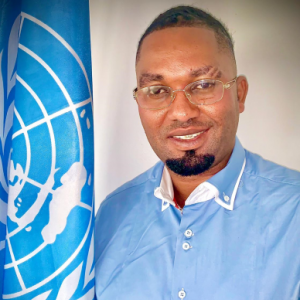Delivering on the vision of a more equal world: UNFPA hands over 10 school latrines in Kigoma Region
28 May 2021
- Muzye Ward, Kasulu District Council, Kigoma Region: Today, as Menstrual Hygiene Day is commemorated around the world, with a call for increased investments and action to realize the collective vision of a world where women and girls can manage their menstruation with dignity and respect, the United Nations sexual and reproductive health agency (UNFPA) handed over-improved latrines to 10 primary schools in Kigoma.
The latrines, built at selected primary schools1 in Irish Aid-supported Ujana Wangu Nguvu Yangu2 – My Youth, My Power – project districts, include a dedicated changing room for girls with an attached incinerator for the disposal of used sanitary pads. Five thousand Dignity Kits, complete with a reusable sanitary pad, were also distributed to school girls, in tandem with menstrual hygiene education sessions. Asma,* one of the recipients of the Dignity Kits, and a student at KumKata primary school, could barely hide her delight. She described the kit, and access to period-friendly sanitation facilities in school, as “a golden opportunity”; a chance to compete as an equal with her male peers.
Managing menstruation is often challenging for adolescent girls in Tanzania – and around the world –but these challenges are exacerbated where privacy and access to water and materials to manage periods are often lacking. Persistent inequalities and perceptions that menstruating is somehow ‘dirty’ or ‘shameful’ can also mean that menstruation and puberty mark the start of restrictions to girls’ mobility and behaviour – a time when their opportunities can radically diminish; a time when they start to miss school and miss out.
Leaving no one behind is the central, transformative promise of the 2030 Agenda for Sustainable Development. Under the four-year Ujana Wangu Nguvu Yangu project in Kigoma Region, UNFPA in Tanzania, with the support of the Government of Ireland, and under the stewardship of regional and local government authorities and its implementing partner the International Rescue Committee, is connecting both humanitarian and development efforts to strengthen health systems to deliver quality and accessible reproductive, maternal, newborn and adolescent health services and information for some of the furthest behind women and young people. This includes building effective and sustainable MHM programmes.
"Ireland is committed to accelerating efforts to help young women and adolescent girls in the community and refugee camps gain the knowledge and tools they need to manage their menstruation safely, hygienically and with dignity," said Mary O’Neill, Ireland’s Ambassador to Tanzania, speaking ahead of the launch. “We recognize the significant role that reproductive health, women's empowerment and gender equality play in sustainable development, and accordingly, the health of women and children is central.”
Since the Ujana Wangu Nguvu Yangu2 began in 2018, over 10,000 girls and boys have been engaged in dialogue to help break the silence and stigma that exists around menstruation, which continues to disempower the girls of Kigoma, negatively affecting their education and health. Some 10,720 reusable sanity pads have also been distributed in Dignity Kits to both in and out-of-schools girls and first-time young mothers, accompanied by sessions on manging periods. Extensive advocacy with school committees, teachers, parents and care takers for period-friendly sanitation facilities in schools has also secured commitment for the replication of the 10 latrines built under the project at more schools in the future.
There is no specific goal or indicator related to menstrual hygiene in the 2030 Agenda for Sustainable Development, but it is integral to the achievement of Sustainable Development Goal (SDG) 3 – good health and well-being – and SDG5 – gender equality and women’s empowerment – as well as several others. UNFPA in Tanzania will continue to support efforts that expand access to affordable and environmentally-friendly menstrual products and period-friendly facilities and bust myths that periods are a problem, so that girls in Kigoma – and around the world – are not held back, but empowered to realize their full potential.
* Name has been changed.
Notes to Editor’s
1. The improved latrines have been built at primary schools in Musivyi, Kumkata, Muhunga and Malembo (Kasulu TC); Muzye and Kigadye (Kasulu DC); Kigaga and Kizazi (Kibondo DC); and Kasongati and Kagondo (Kakonko DC).
2. UNFPA began implementing the four-year Ujana Wangu Nguvu Yangu – My Youth, My Power – project in 2018. The project is funded by Irish Aid, under the stewardship of the Government of the United Republic of Tanzania and regional and district government authorities, and is designed to strengthen the health system to provide quality services to end preventable, maternal, newborn and child deaths and to ensure universal access to sexual and reproductive and adolescent health services. The project targets women and young people in local communities in five districts of Kigoma Region – Kasulu DC, Kasulu TC, Kibondo DC, Kakonko DC, and Uvinza DC – with targeted support to young people living in the three refugee camps in Kigoma: Nyarugusu, Nduta, and Mtendeli.




